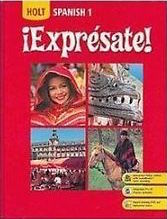
All Solutions
Page 260: Preparate para el examen
*Miguelito tiene que vestirse. (Miguelito has to get dressed.)*
*El señor Blanco tiene que afeitarse. (Mr. Blanco has to shave.)*
*Elena tiene que maquillarse. (Elena has to do her makeup.)*
The sentence reads:
*In the morning, my mother _____ until 6.*
In this context, *dormir* makes the most sense. “My mother **sleeps** until 6.”
Note that “dormir” has an **o –> ue** stem change in this form.
The sentence reads:
*In the morning, my mother sleeps until 6. Then she ________ …*
In this context, *levantarse* makes the most sense. “My mother sleeps until 6. Then, she **gets up**…”
The sentence reads:
*In the morning, my mother sleeps until 6. Then she gets up and _____ before breakfast.*
In this context, *vestirse* makes the most sense. “Then she gets up and **gets dressed** before breakfast.”
Note that “vestirse” has an **e –> i** stem change in this form.
The sentence reads:
*I get up very early to _____ before going to school.*
In this exercise, entrenarse makes the most sense. “I get up very early to **work out**…”
The sentence reads:
*After classes, my siblings and I ____ watch TV for a while…*
In this context, poder makes the most sense “After classes, my siblings and I **can** watch TV for a while…”
The sentence reads:
*After classes, my siblings and I can watch TV for a while before _____ homework.*
In this context, *empezar* makes the most sense. “My siblings and I can watch TV for a while before **starting** homework.”
The sentence reads:
*Sometimes my sister Maribel ______ video games.*
In this context, *jugar* makes the most sense. “Sometimes my sister Maribel **plays** video games.”
Note that “jugar” has an **u –> ue** stem change in this form.
The sentence reads:
*In the evening, I _____ and then listen to music…*
In this context, *bañarse* makes the most sense. “In the evening, I **take a bath**…”
The sentence reads:
*In the evening, I take a bath and then listen to music to ______ a little bit before going to bed.*
In this context, *relajarse* makes the most sense.
“I take a bath and then listen to music to **relax** a little bit before going to bed.”
For example:
*Debes hacer yoga para…* *(You have to do yoga to…)*
In the brackets, you have *ser perezoso (to be lazy)* and *buscar un pasatiempo (to search for a hobby).* Here is advice you can give to your friend:
*No seas perezoso. Busca un pasatiempo. (Don’t be lazy. Search for a hobby.)*
In the brackets, you have *acostarse más temprano (to go to bed earlier)* and buscar un *dormir en clase (to sleep in class).* Here is advice you can give to your friend:
*No duermas en clase. Acuéstate más temprano. (Don’t sleep in class. Go to bed earlier.)*
In the brackets, you have *ser tímido (to be shy)* and *hablar (to talk/to speak up)*. Here is advice you can give to your friend:
*No seas tímido. Habla más a menudo. (Don’t be shy. Speak up more often.)*
In the brackets, you have *comer comida sana (to eat healthy food)* and *pedir muchos postres (to order (too) many desserts)*. Here is advice you can give to your friend:
*No pidas muchos postres. Come comida sana. (Don’t order too many desserts. Eat healthy food.)*
In the brackets, you have *ver tanta televisión (to watch TV so much)* and *comprar lentes (to buy glasses)*. Here is advice you can give to your friend:
*No veas tanta televisión. Compra lentes. (Don’t watch TV so much. Buy glasses.)*
*El deporte que se practica en Bariloche en julio es el esquí. (The sport that is practiced in Bariloche in July is skiing.)*
*Algunos de los platos populares en Argentina son las parrilladas y la milanesa napolitana. (Some of the popular foods in Argentina are *parrilladas* and milanesa napolitana.)*
*El mate es una bebida muy conocida en algunos países de América del Sur. Se prepara poniendo una hierba seca llamada yerba mate en una taza de metal con agua caliente.
(Mate is a very popular drink in some South American countries. It is prepared by putting a dried herb called yerba mate in a metal cup with hot water.)*
According to the first instruction that you’re given, you have to ask your classmate how he/she is and tell him/her that he/she doesn’t look well.
*Cómo te sientes? No te veo bien.*

